An In-Depth Analysis of Mentoring Programs and Their Business Impact
VerifiedAdded on 2020/01/07
|10
|3247
|178
Report
AI Summary
This report delves into the significance of mentoring programs within the business context, analyzing their various roles and benefits in the contemporary workplace. The report begins by defining mentoring programs, explaining how mentors, typically senior employees, guide and support junior colleagues, particularly newcomers, by sharing their knowledge and experience. It highlights the increasing prevalence of these programs and their contribution to employee development, skill enhancement, and retention. The report examines the key roles mentoring programs play in businesses, including setting objectives, providing leadership support, and ensuring flexibility. It also explores the benefits, such as increased employee satisfaction, worker retention, improved onboarding, and enhanced worker productivity. Furthermore, the report discusses the emergence of mentoring programs as a solution for assisting new employees in understanding business operations and the advantages for firms that use these programs, such as talent development and cost-effectiveness. In conclusion, the report emphasizes the importance of mentoring programs for maximizing business growth and ensuring the development of employees' skills and retention within the organization.
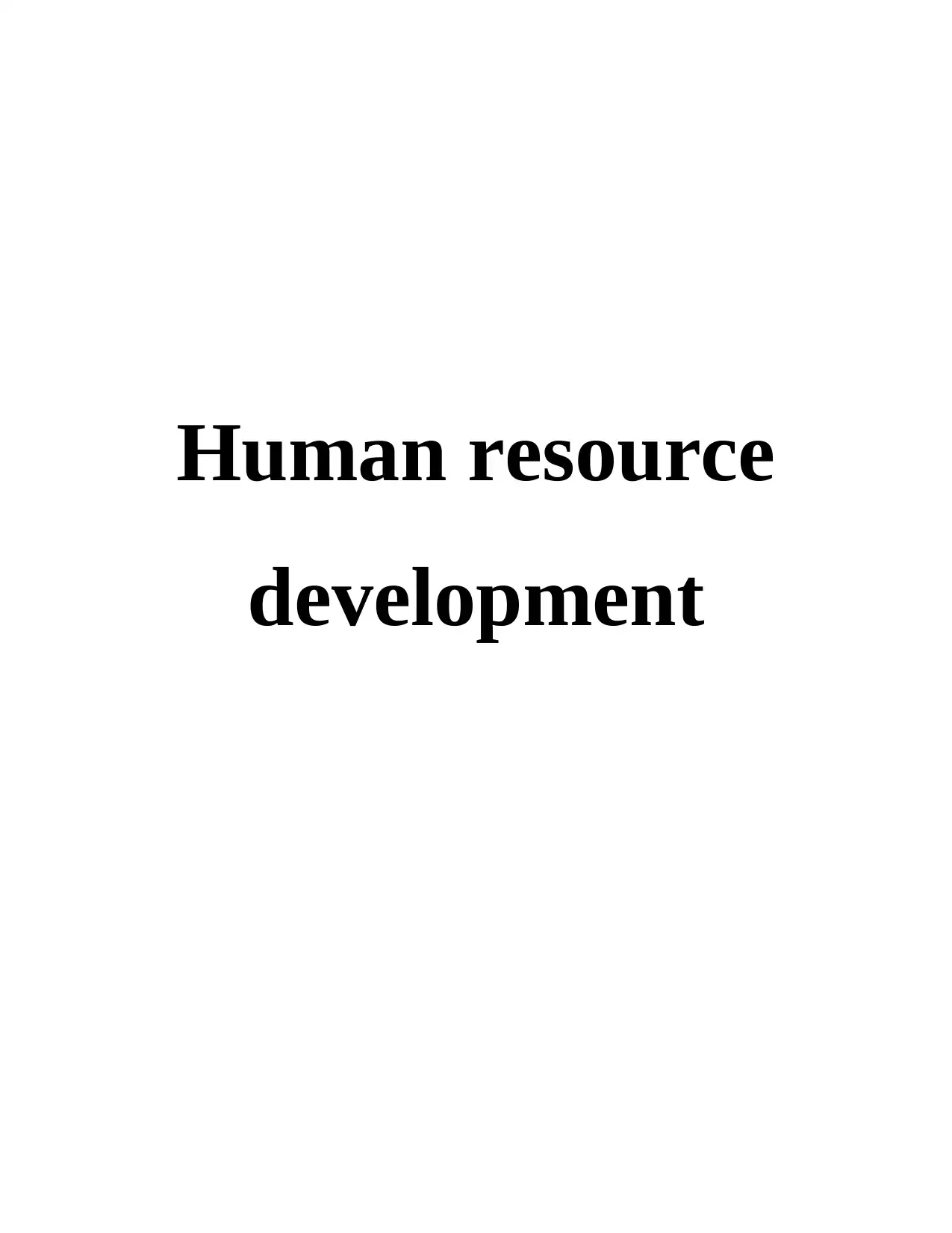
Human resource
development
development
Paraphrase This Document
Need a fresh take? Get an instant paraphrase of this document with our AI Paraphraser
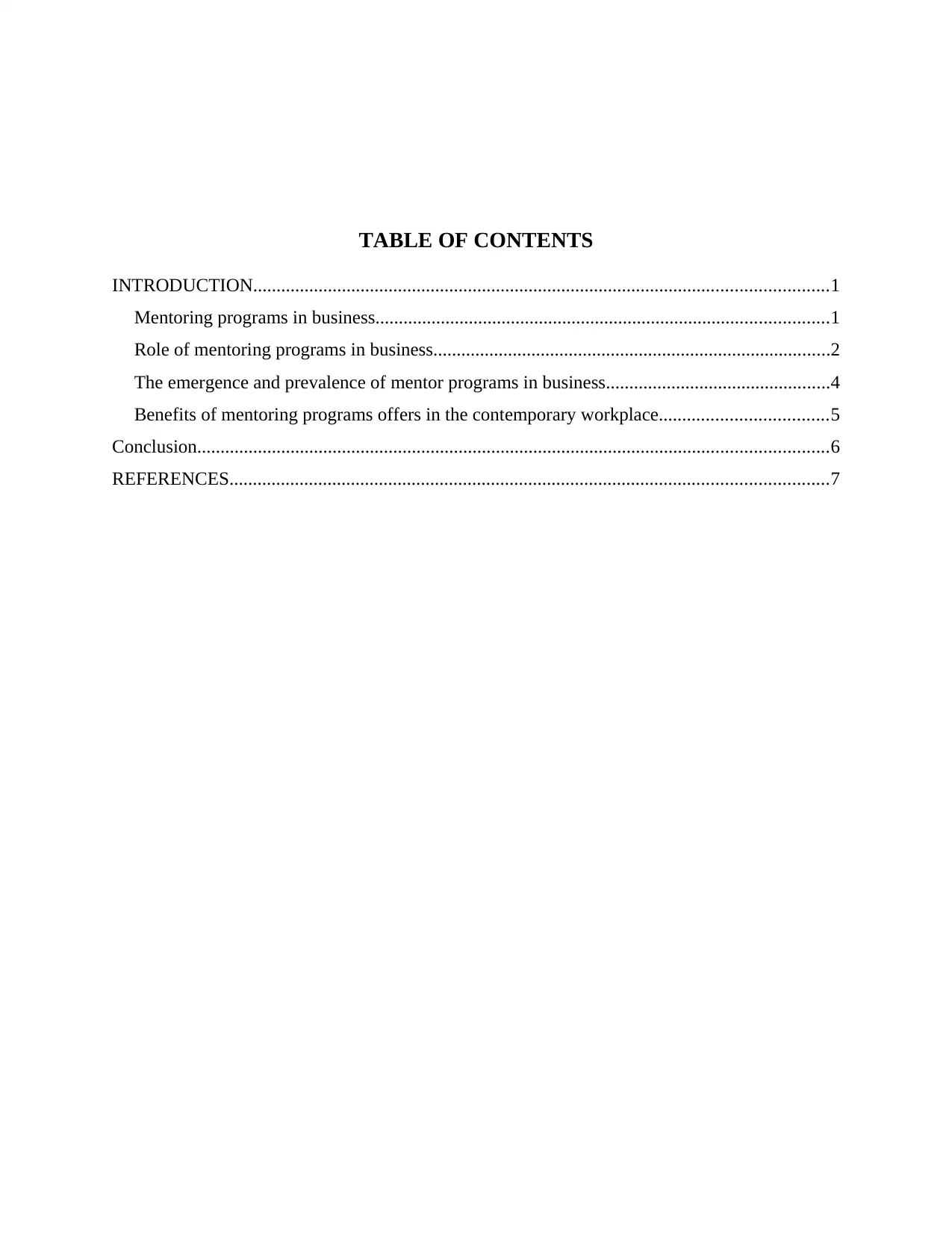
TABLE OF CONTENTS
INTRODUCTION...........................................................................................................................1
Mentoring programs in business.................................................................................................1
Role of mentoring programs in business.....................................................................................2
The emergence and prevalence of mentor programs in business................................................4
Benefits of mentoring programs offers in the contemporary workplace....................................5
Conclusion.......................................................................................................................................6
REFERENCES................................................................................................................................7
INTRODUCTION...........................................................................................................................1
Mentoring programs in business.................................................................................................1
Role of mentoring programs in business.....................................................................................2
The emergence and prevalence of mentor programs in business................................................4
Benefits of mentoring programs offers in the contemporary workplace....................................5
Conclusion.......................................................................................................................................6
REFERENCES................................................................................................................................7
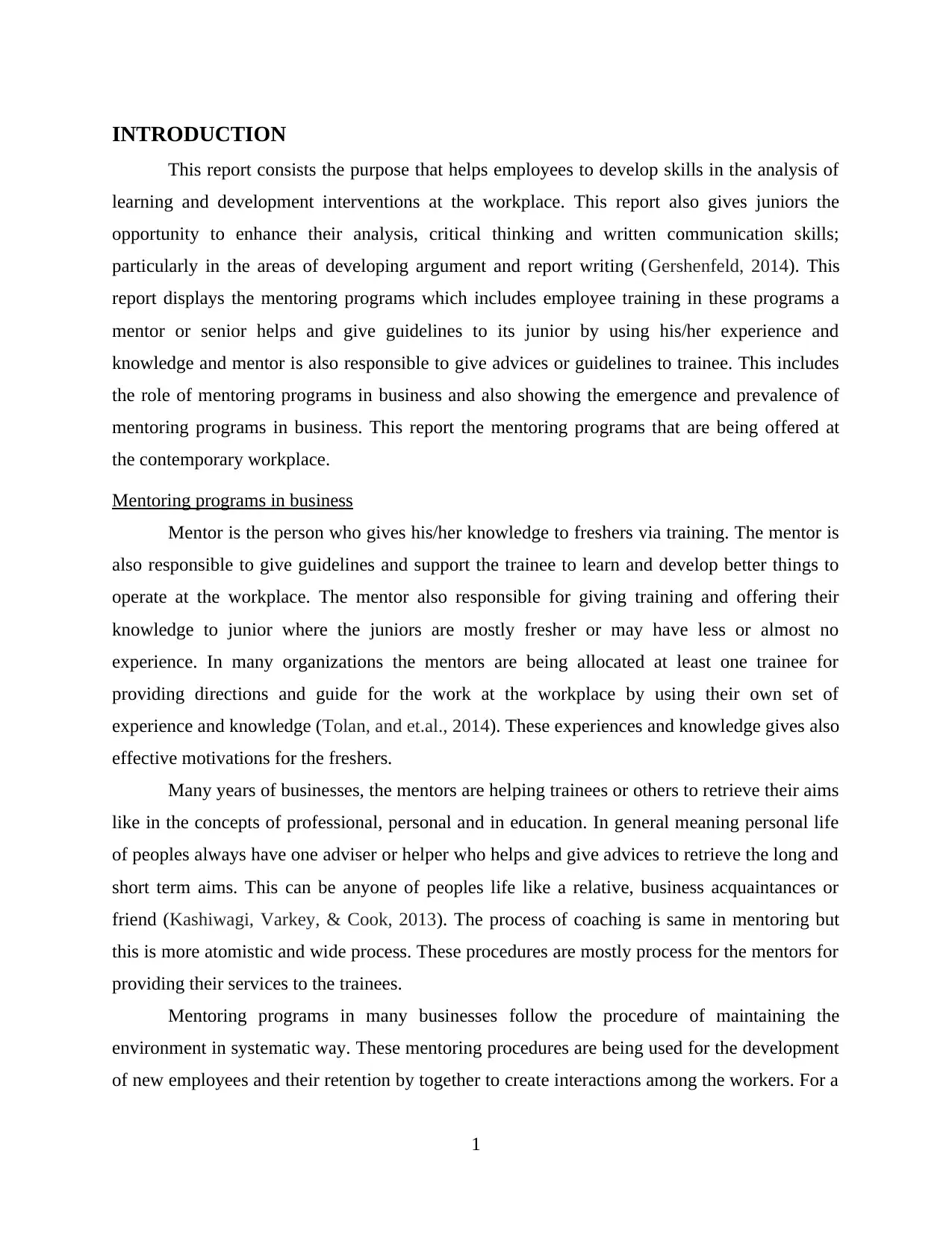
INTRODUCTION
This report consists the purpose that helps employees to develop skills in the analysis of
learning and development interventions at the workplace. This report also gives juniors the
opportunity to enhance their analysis, critical thinking and written communication skills;
particularly in the areas of developing argument and report writing (Gershenfeld, 2014). This
report displays the mentoring programs which includes employee training in these programs a
mentor or senior helps and give guidelines to its junior by using his/her experience and
knowledge and mentor is also responsible to give advices or guidelines to trainee. This includes
the role of mentoring programs in business and also showing the emergence and prevalence of
mentoring programs in business. This report the mentoring programs that are being offered at
the contemporary workplace.
Mentoring programs in business
Mentor is the person who gives his/her knowledge to freshers via training. The mentor is
also responsible to give guidelines and support the trainee to learn and develop better things to
operate at the workplace. The mentor also responsible for giving training and offering their
knowledge to junior where the juniors are mostly fresher or may have less or almost no
experience. In many organizations the mentors are being allocated at least one trainee for
providing directions and guide for the work at the workplace by using their own set of
experience and knowledge (Tolan, and et.al., 2014). These experiences and knowledge gives also
effective motivations for the freshers.
Many years of businesses, the mentors are helping trainees or others to retrieve their aims
like in the concepts of professional, personal and in education. In general meaning personal life
of peoples always have one adviser or helper who helps and give advices to retrieve the long and
short term aims. This can be anyone of peoples life like a relative, business acquaintances or
friend (Kashiwagi, Varkey, & Cook, 2013). The process of coaching is same in mentoring but
this is more atomistic and wide process. These procedures are mostly process for the mentors for
providing their services to the trainees.
Mentoring programs in many businesses follow the procedure of maintaining the
environment in systematic way. These mentoring procedures are being used for the development
of new employees and their retention by together to create interactions among the workers. For a
1
This report consists the purpose that helps employees to develop skills in the analysis of
learning and development interventions at the workplace. This report also gives juniors the
opportunity to enhance their analysis, critical thinking and written communication skills;
particularly in the areas of developing argument and report writing (Gershenfeld, 2014). This
report displays the mentoring programs which includes employee training in these programs a
mentor or senior helps and give guidelines to its junior by using his/her experience and
knowledge and mentor is also responsible to give advices or guidelines to trainee. This includes
the role of mentoring programs in business and also showing the emergence and prevalence of
mentoring programs in business. This report the mentoring programs that are being offered at
the contemporary workplace.
Mentoring programs in business
Mentor is the person who gives his/her knowledge to freshers via training. The mentor is
also responsible to give guidelines and support the trainee to learn and develop better things to
operate at the workplace. The mentor also responsible for giving training and offering their
knowledge to junior where the juniors are mostly fresher or may have less or almost no
experience. In many organizations the mentors are being allocated at least one trainee for
providing directions and guide for the work at the workplace by using their own set of
experience and knowledge (Tolan, and et.al., 2014). These experiences and knowledge gives also
effective motivations for the freshers.
Many years of businesses, the mentors are helping trainees or others to retrieve their aims
like in the concepts of professional, personal and in education. In general meaning personal life
of peoples always have one adviser or helper who helps and give advices to retrieve the long and
short term aims. This can be anyone of peoples life like a relative, business acquaintances or
friend (Kashiwagi, Varkey, & Cook, 2013). The process of coaching is same in mentoring but
this is more atomistic and wide process. These procedures are mostly process for the mentors for
providing their services to the trainees.
Mentoring programs in many businesses follow the procedure of maintaining the
environment in systematic way. These mentoring procedures are being used for the development
of new employees and their retention by together to create interactions among the workers. For a
1
⊘ This is a preview!⊘
Do you want full access?
Subscribe today to unlock all pages.

Trusted by 1+ million students worldwide
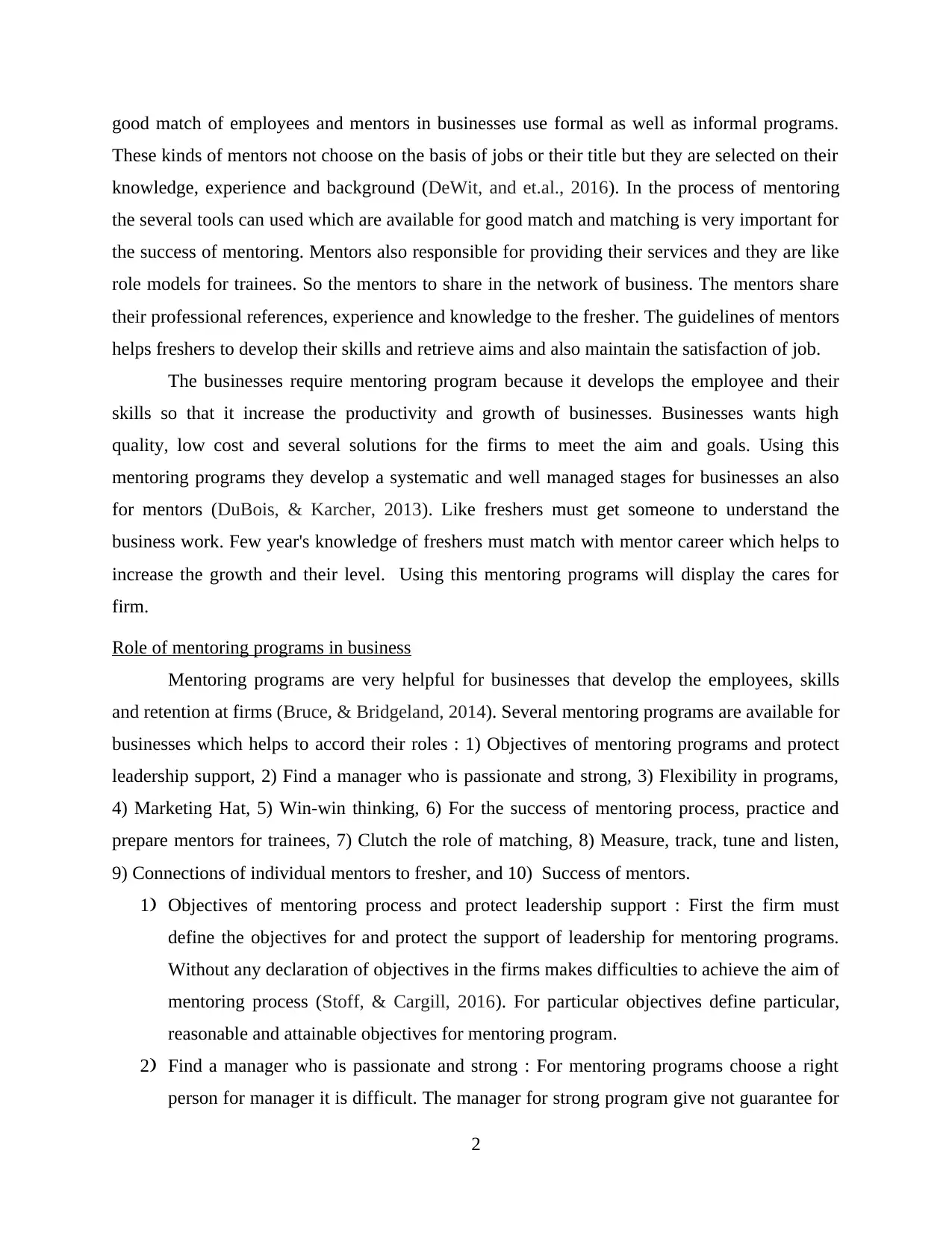
good match of employees and mentors in businesses use formal as well as informal programs.
These kinds of mentors not choose on the basis of jobs or their title but they are selected on their
knowledge, experience and background (DeWit, and et.al., 2016). In the process of mentoring
the several tools can used which are available for good match and matching is very important for
the success of mentoring. Mentors also responsible for providing their services and they are like
role models for trainees. So the mentors to share in the network of business. The mentors share
their professional references, experience and knowledge to the fresher. The guidelines of mentors
helps freshers to develop their skills and retrieve aims and also maintain the satisfaction of job.
The businesses require mentoring program because it develops the employee and their
skills so that it increase the productivity and growth of businesses. Businesses wants high
quality, low cost and several solutions for the firms to meet the aim and goals. Using this
mentoring programs they develop a systematic and well managed stages for businesses an also
for mentors (DuBois, & Karcher, 2013). Like freshers must get someone to understand the
business work. Few year's knowledge of freshers must match with mentor career which helps to
increase the growth and their level. Using this mentoring programs will display the cares for
firm.
Role of mentoring programs in business
Mentoring programs are very helpful for businesses that develop the employees, skills
and retention at firms (Bruce, & Bridgeland, 2014). Several mentoring programs are available for
businesses which helps to accord their roles : 1) Objectives of mentoring programs and protect
leadership support, 2) Find a manager who is passionate and strong, 3) Flexibility in programs,
4) Marketing Hat, 5) Win-win thinking, 6) For the success of mentoring process, practice and
prepare mentors for trainees, 7) Clutch the role of matching, 8) Measure, track, tune and listen,
9) Connections of individual mentors to fresher, and 10) Success of mentors.
1) Objectives of mentoring process and protect leadership support : First the firm must
define the objectives for and protect the support of leadership for mentoring programs.
Without any declaration of objectives in the firms makes difficulties to achieve the aim of
mentoring process (Stoff, & Cargill, 2016). For particular objectives define particular,
reasonable and attainable objectives for mentoring program.
2) Find a manager who is passionate and strong : For mentoring programs choose a right
person for manager it is difficult. The manager for strong program give not guarantee for
2
These kinds of mentors not choose on the basis of jobs or their title but they are selected on their
knowledge, experience and background (DeWit, and et.al., 2016). In the process of mentoring
the several tools can used which are available for good match and matching is very important for
the success of mentoring. Mentors also responsible for providing their services and they are like
role models for trainees. So the mentors to share in the network of business. The mentors share
their professional references, experience and knowledge to the fresher. The guidelines of mentors
helps freshers to develop their skills and retrieve aims and also maintain the satisfaction of job.
The businesses require mentoring program because it develops the employee and their
skills so that it increase the productivity and growth of businesses. Businesses wants high
quality, low cost and several solutions for the firms to meet the aim and goals. Using this
mentoring programs they develop a systematic and well managed stages for businesses an also
for mentors (DuBois, & Karcher, 2013). Like freshers must get someone to understand the
business work. Few year's knowledge of freshers must match with mentor career which helps to
increase the growth and their level. Using this mentoring programs will display the cares for
firm.
Role of mentoring programs in business
Mentoring programs are very helpful for businesses that develop the employees, skills
and retention at firms (Bruce, & Bridgeland, 2014). Several mentoring programs are available for
businesses which helps to accord their roles : 1) Objectives of mentoring programs and protect
leadership support, 2) Find a manager who is passionate and strong, 3) Flexibility in programs,
4) Marketing Hat, 5) Win-win thinking, 6) For the success of mentoring process, practice and
prepare mentors for trainees, 7) Clutch the role of matching, 8) Measure, track, tune and listen,
9) Connections of individual mentors to fresher, and 10) Success of mentors.
1) Objectives of mentoring process and protect leadership support : First the firm must
define the objectives for and protect the support of leadership for mentoring programs.
Without any declaration of objectives in the firms makes difficulties to achieve the aim of
mentoring process (Stoff, & Cargill, 2016). For particular objectives define particular,
reasonable and attainable objectives for mentoring program.
2) Find a manager who is passionate and strong : For mentoring programs choose a right
person for manager it is difficult. The manager for strong program give not guarantee for
2
Paraphrase This Document
Need a fresh take? Get an instant paraphrase of this document with our AI Paraphraser
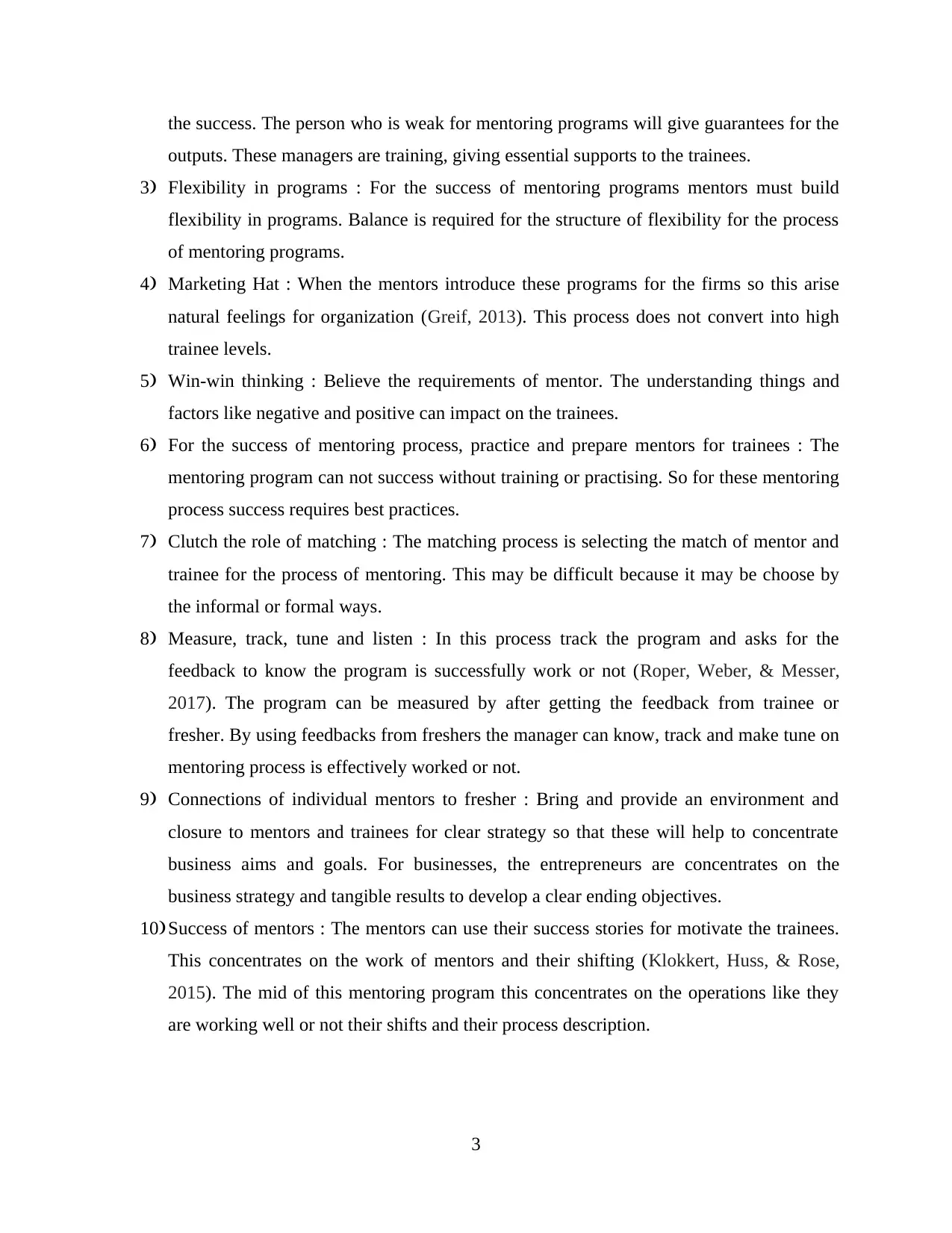
the success. The person who is weak for mentoring programs will give guarantees for the
outputs. These managers are training, giving essential supports to the trainees.
3) Flexibility in programs : For the success of mentoring programs mentors must build
flexibility in programs. Balance is required for the structure of flexibility for the process
of mentoring programs.
4) Marketing Hat : When the mentors introduce these programs for the firms so this arise
natural feelings for organization (Greif, 2013). This process does not convert into high
trainee levels.
5) Win-win thinking : Believe the requirements of mentor. The understanding things and
factors like negative and positive can impact on the trainees.
6) For the success of mentoring process, practice and prepare mentors for trainees : The
mentoring program can not success without training or practising. So for these mentoring
process success requires best practices.
7) Clutch the role of matching : The matching process is selecting the match of mentor and
trainee for the process of mentoring. This may be difficult because it may be choose by
the informal or formal ways.
8) Measure, track, tune and listen : In this process track the program and asks for the
feedback to know the program is successfully work or not (Roper, Weber, & Messer,
2017). The program can be measured by after getting the feedback from trainee or
fresher. By using feedbacks from freshers the manager can know, track and make tune on
mentoring process is effectively worked or not.
9) Connections of individual mentors to fresher : Bring and provide an environment and
closure to mentors and trainees for clear strategy so that these will help to concentrate
business aims and goals. For businesses, the entrepreneurs are concentrates on the
business strategy and tangible results to develop a clear ending objectives.
10) Success of mentors : The mentors can use their success stories for motivate the trainees.
This concentrates on the work of mentors and their shifting (Klokkert, Huss, & Rose,
2015). The mid of this mentoring program this concentrates on the operations like they
are working well or not their shifts and their process description.
3
outputs. These managers are training, giving essential supports to the trainees.
3) Flexibility in programs : For the success of mentoring programs mentors must build
flexibility in programs. Balance is required for the structure of flexibility for the process
of mentoring programs.
4) Marketing Hat : When the mentors introduce these programs for the firms so this arise
natural feelings for organization (Greif, 2013). This process does not convert into high
trainee levels.
5) Win-win thinking : Believe the requirements of mentor. The understanding things and
factors like negative and positive can impact on the trainees.
6) For the success of mentoring process, practice and prepare mentors for trainees : The
mentoring program can not success without training or practising. So for these mentoring
process success requires best practices.
7) Clutch the role of matching : The matching process is selecting the match of mentor and
trainee for the process of mentoring. This may be difficult because it may be choose by
the informal or formal ways.
8) Measure, track, tune and listen : In this process track the program and asks for the
feedback to know the program is successfully work or not (Roper, Weber, & Messer,
2017). The program can be measured by after getting the feedback from trainee or
fresher. By using feedbacks from freshers the manager can know, track and make tune on
mentoring process is effectively worked or not.
9) Connections of individual mentors to fresher : Bring and provide an environment and
closure to mentors and trainees for clear strategy so that these will help to concentrate
business aims and goals. For businesses, the entrepreneurs are concentrates on the
business strategy and tangible results to develop a clear ending objectives.
10) Success of mentors : The mentors can use their success stories for motivate the trainees.
This concentrates on the work of mentors and their shifting (Klokkert, Huss, & Rose,
2015). The mid of this mentoring program this concentrates on the operations like they
are working well or not their shifts and their process description.
3
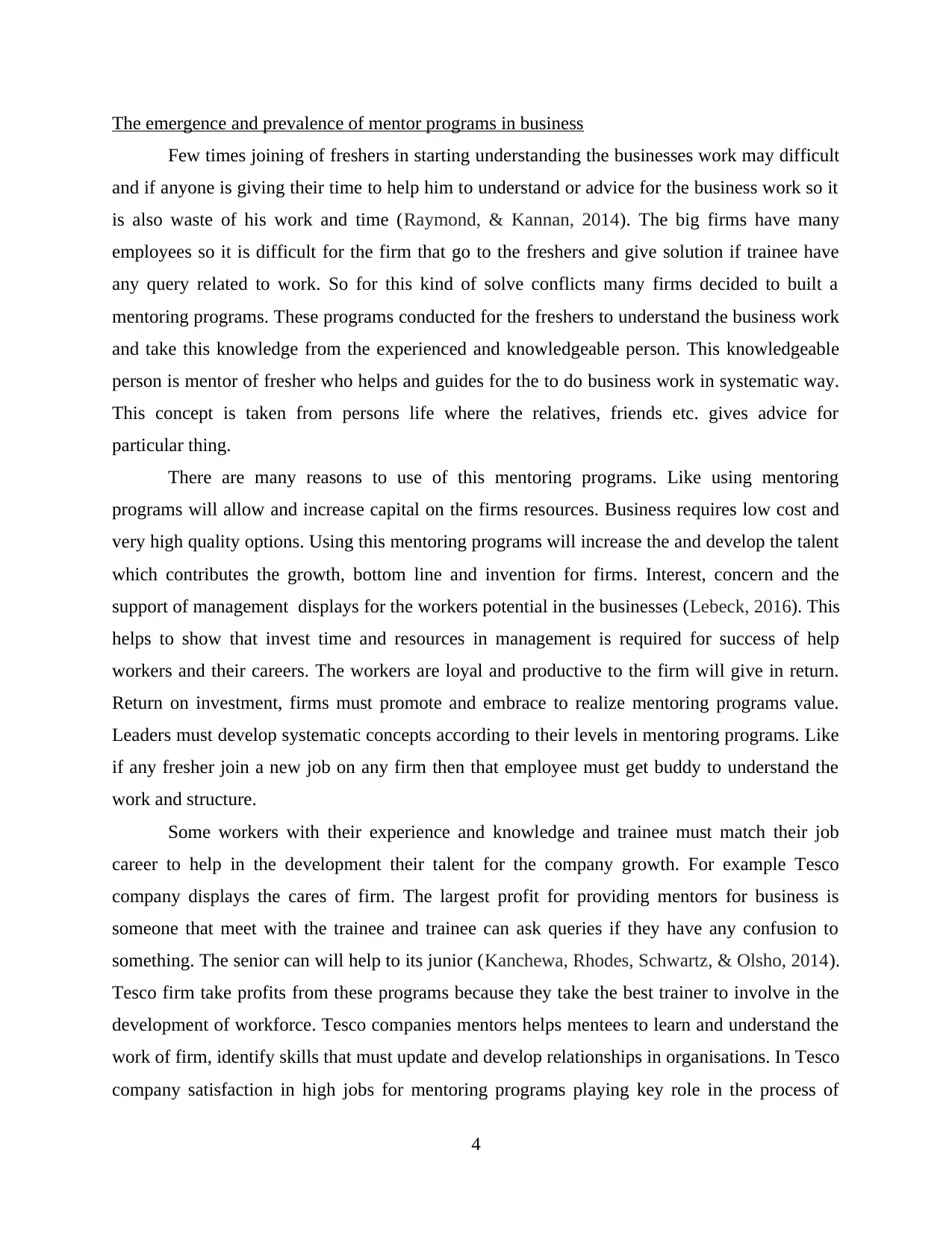
The emergence and prevalence of mentor programs in business
Few times joining of freshers in starting understanding the businesses work may difficult
and if anyone is giving their time to help him to understand or advice for the business work so it
is also waste of his work and time (Raymond, & Kannan, 2014). The big firms have many
employees so it is difficult for the firm that go to the freshers and give solution if trainee have
any query related to work. So for this kind of solve conflicts many firms decided to built a
mentoring programs. These programs conducted for the freshers to understand the business work
and take this knowledge from the experienced and knowledgeable person. This knowledgeable
person is mentor of fresher who helps and guides for the to do business work in systematic way.
This concept is taken from persons life where the relatives, friends etc. gives advice for
particular thing.
There are many reasons to use of this mentoring programs. Like using mentoring
programs will allow and increase capital on the firms resources. Business requires low cost and
very high quality options. Using this mentoring programs will increase the and develop the talent
which contributes the growth, bottom line and invention for firms. Interest, concern and the
support of management displays for the workers potential in the businesses (Lebeck, 2016). This
helps to show that invest time and resources in management is required for success of help
workers and their careers. The workers are loyal and productive to the firm will give in return.
Return on investment, firms must promote and embrace to realize mentoring programs value.
Leaders must develop systematic concepts according to their levels in mentoring programs. Like
if any fresher join a new job on any firm then that employee must get buddy to understand the
work and structure.
Some workers with their experience and knowledge and trainee must match their job
career to help in the development their talent for the company growth. For example Tesco
company displays the cares of firm. The largest profit for providing mentors for business is
someone that meet with the trainee and trainee can ask queries if they have any confusion to
something. The senior can will help to its junior (Kanchewa, Rhodes, Schwartz, & Olsho, 2014).
Tesco firm take profits from these programs because they take the best trainer to involve in the
development of workforce. Tesco companies mentors helps mentees to learn and understand the
work of firm, identify skills that must update and develop relationships in organisations. In Tesco
company satisfaction in high jobs for mentoring programs playing key role in the process of
4
Few times joining of freshers in starting understanding the businesses work may difficult
and if anyone is giving their time to help him to understand or advice for the business work so it
is also waste of his work and time (Raymond, & Kannan, 2014). The big firms have many
employees so it is difficult for the firm that go to the freshers and give solution if trainee have
any query related to work. So for this kind of solve conflicts many firms decided to built a
mentoring programs. These programs conducted for the freshers to understand the business work
and take this knowledge from the experienced and knowledgeable person. This knowledgeable
person is mentor of fresher who helps and guides for the to do business work in systematic way.
This concept is taken from persons life where the relatives, friends etc. gives advice for
particular thing.
There are many reasons to use of this mentoring programs. Like using mentoring
programs will allow and increase capital on the firms resources. Business requires low cost and
very high quality options. Using this mentoring programs will increase the and develop the talent
which contributes the growth, bottom line and invention for firms. Interest, concern and the
support of management displays for the workers potential in the businesses (Lebeck, 2016). This
helps to show that invest time and resources in management is required for success of help
workers and their careers. The workers are loyal and productive to the firm will give in return.
Return on investment, firms must promote and embrace to realize mentoring programs value.
Leaders must develop systematic concepts according to their levels in mentoring programs. Like
if any fresher join a new job on any firm then that employee must get buddy to understand the
work and structure.
Some workers with their experience and knowledge and trainee must match their job
career to help in the development their talent for the company growth. For example Tesco
company displays the cares of firm. The largest profit for providing mentors for business is
someone that meet with the trainee and trainee can ask queries if they have any confusion to
something. The senior can will help to its junior (Kanchewa, Rhodes, Schwartz, & Olsho, 2014).
Tesco firm take profits from these programs because they take the best trainer to involve in the
development of workforce. Tesco companies mentors helps mentees to learn and understand the
work of firm, identify skills that must update and develop relationships in organisations. In Tesco
company satisfaction in high jobs for mentoring programs playing key role in the process of
4
⊘ This is a preview!⊘
Do you want full access?
Subscribe today to unlock all pages.

Trusted by 1+ million students worldwide
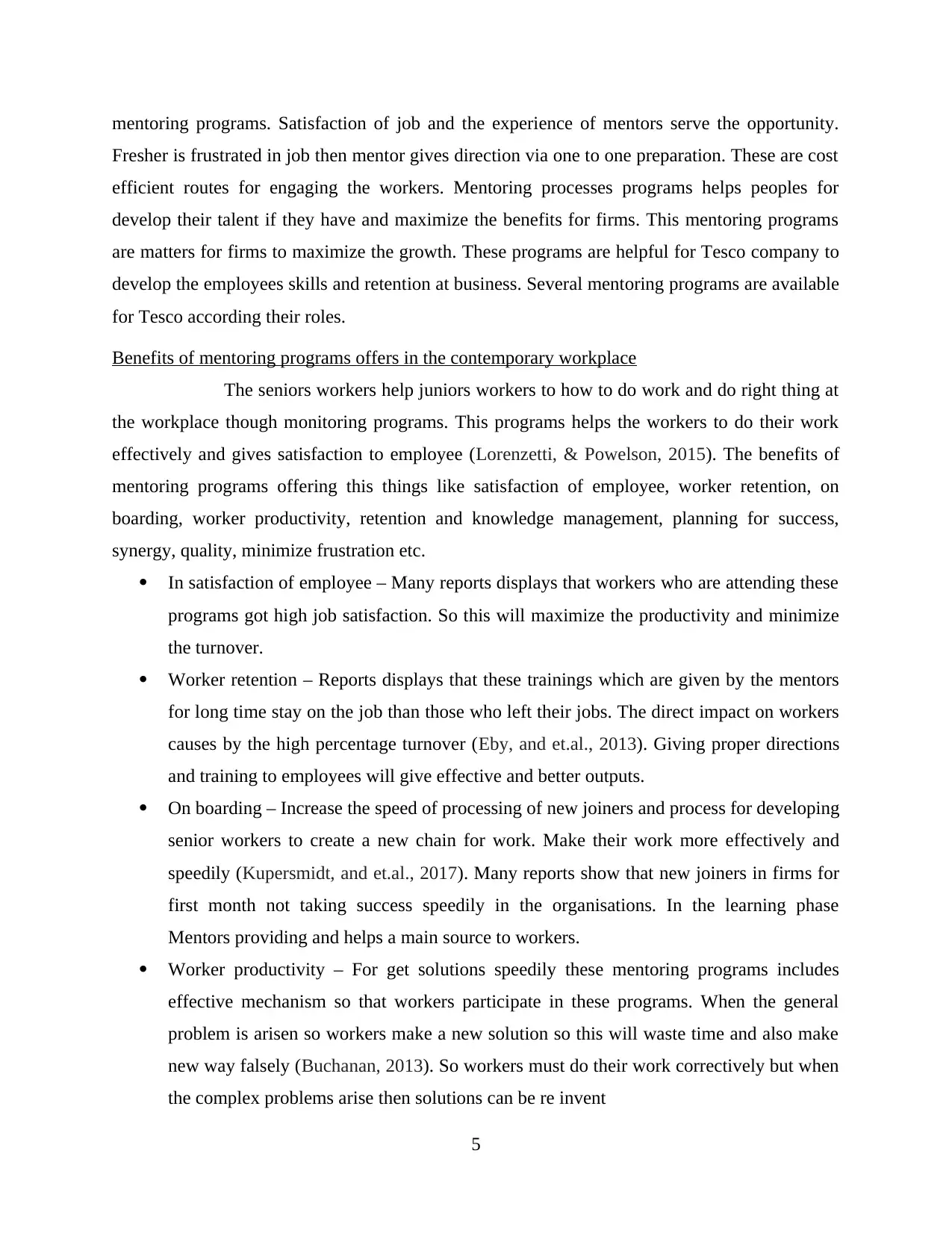
mentoring programs. Satisfaction of job and the experience of mentors serve the opportunity.
Fresher is frustrated in job then mentor gives direction via one to one preparation. These are cost
efficient routes for engaging the workers. Mentoring processes programs helps peoples for
develop their talent if they have and maximize the benefits for firms. This mentoring programs
are matters for firms to maximize the growth. These programs are helpful for Tesco company to
develop the employees skills and retention at business. Several mentoring programs are available
for Tesco according their roles.
Benefits of mentoring programs offers in the contemporary workplace
The seniors workers help juniors workers to how to do work and do right thing at
the workplace though monitoring programs. This programs helps the workers to do their work
effectively and gives satisfaction to employee (Lorenzetti, & Powelson, 2015). The benefits of
mentoring programs offering this things like satisfaction of employee, worker retention, on
boarding, worker productivity, retention and knowledge management, planning for success,
synergy, quality, minimize frustration etc.
In satisfaction of employee – Many reports displays that workers who are attending these
programs got high job satisfaction. So this will maximize the productivity and minimize
the turnover.
Worker retention – Reports displays that these trainings which are given by the mentors
for long time stay on the job than those who left their jobs. The direct impact on workers
causes by the high percentage turnover (Eby, and et.al., 2013). Giving proper directions
and training to employees will give effective and better outputs.
On boarding – Increase the speed of processing of new joiners and process for developing
senior workers to create a new chain for work. Make their work more effectively and
speedily (Kupersmidt, and et.al., 2017). Many reports show that new joiners in firms for
first month not taking success speedily in the organisations. In the learning phase
Mentors providing and helps a main source to workers.
Worker productivity – For get solutions speedily these mentoring programs includes
effective mechanism so that workers participate in these programs. When the general
problem is arisen so workers make a new solution so this will waste time and also make
new way falsely (Buchanan, 2013). So workers must do their work correctively but when
the complex problems arise then solutions can be re invent
5
Fresher is frustrated in job then mentor gives direction via one to one preparation. These are cost
efficient routes for engaging the workers. Mentoring processes programs helps peoples for
develop their talent if they have and maximize the benefits for firms. This mentoring programs
are matters for firms to maximize the growth. These programs are helpful for Tesco company to
develop the employees skills and retention at business. Several mentoring programs are available
for Tesco according their roles.
Benefits of mentoring programs offers in the contemporary workplace
The seniors workers help juniors workers to how to do work and do right thing at
the workplace though monitoring programs. This programs helps the workers to do their work
effectively and gives satisfaction to employee (Lorenzetti, & Powelson, 2015). The benefits of
mentoring programs offering this things like satisfaction of employee, worker retention, on
boarding, worker productivity, retention and knowledge management, planning for success,
synergy, quality, minimize frustration etc.
In satisfaction of employee – Many reports displays that workers who are attending these
programs got high job satisfaction. So this will maximize the productivity and minimize
the turnover.
Worker retention – Reports displays that these trainings which are given by the mentors
for long time stay on the job than those who left their jobs. The direct impact on workers
causes by the high percentage turnover (Eby, and et.al., 2013). Giving proper directions
and training to employees will give effective and better outputs.
On boarding – Increase the speed of processing of new joiners and process for developing
senior workers to create a new chain for work. Make their work more effectively and
speedily (Kupersmidt, and et.al., 2017). Many reports show that new joiners in firms for
first month not taking success speedily in the organisations. In the learning phase
Mentors providing and helps a main source to workers.
Worker productivity – For get solutions speedily these mentoring programs includes
effective mechanism so that workers participate in these programs. When the general
problem is arisen so workers make a new solution so this will waste time and also make
new way falsely (Buchanan, 2013). So workers must do their work correctively but when
the complex problems arise then solutions can be re invent
5
Paraphrase This Document
Need a fresh take? Get an instant paraphrase of this document with our AI Paraphraser
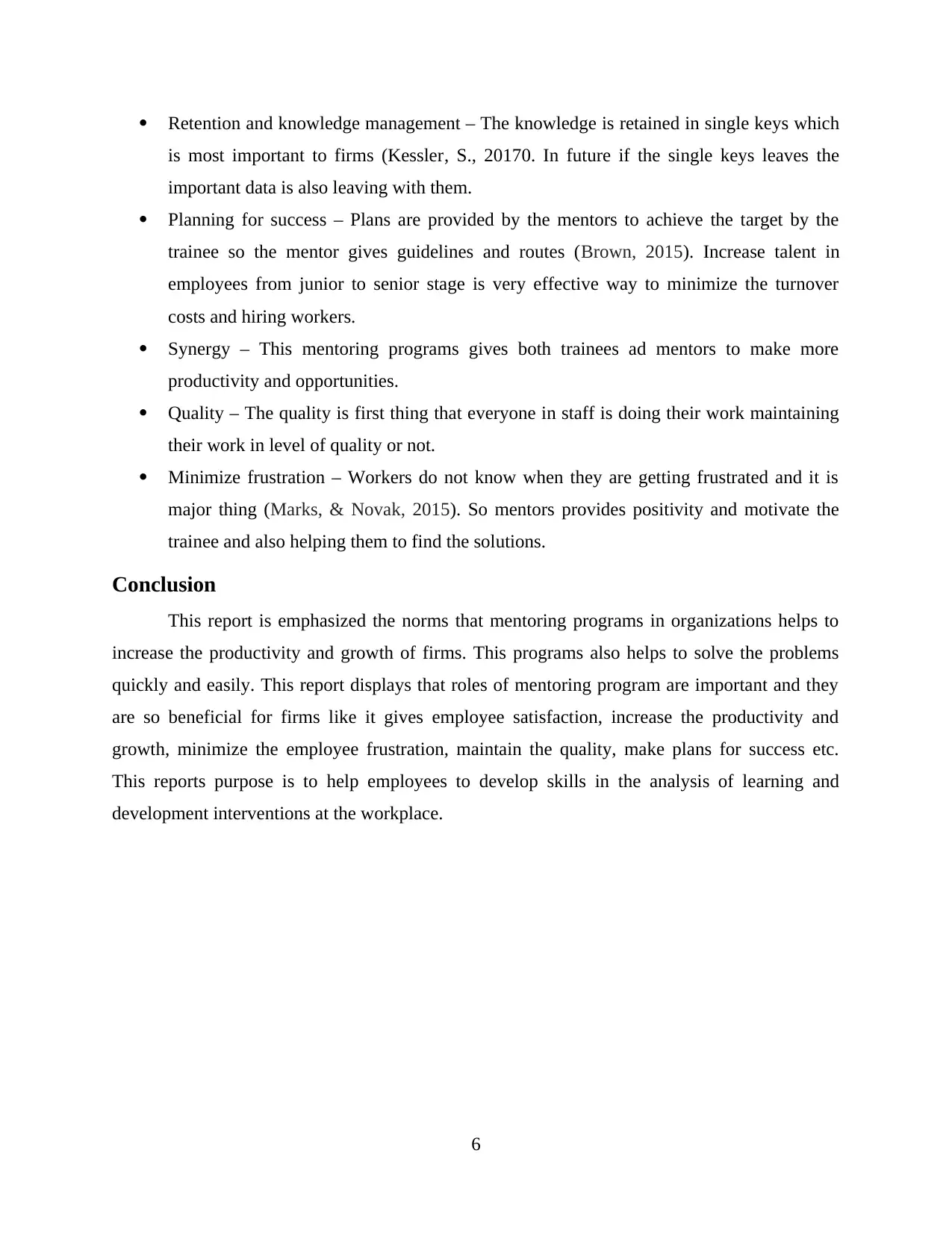
Retention and knowledge management – The knowledge is retained in single keys which
is most important to firms (Kessler, S., 20170. In future if the single keys leaves the
important data is also leaving with them.
Planning for success – Plans are provided by the mentors to achieve the target by the
trainee so the mentor gives guidelines and routes (Brown, 2015). Increase talent in
employees from junior to senior stage is very effective way to minimize the turnover
costs and hiring workers.
Synergy – This mentoring programs gives both trainees ad mentors to make more
productivity and opportunities.
Quality – The quality is first thing that everyone in staff is doing their work maintaining
their work in level of quality or not.
Minimize frustration – Workers do not know when they are getting frustrated and it is
major thing (Marks, & Novak, 2015). So mentors provides positivity and motivate the
trainee and also helping them to find the solutions.
Conclusion
This report is emphasized the norms that mentoring programs in organizations helps to
increase the productivity and growth of firms. This programs also helps to solve the problems
quickly and easily. This report displays that roles of mentoring program are important and they
are so beneficial for firms like it gives employee satisfaction, increase the productivity and
growth, minimize the employee frustration, maintain the quality, make plans for success etc.
This reports purpose is to help employees to develop skills in the analysis of learning and
development interventions at the workplace.
6
is most important to firms (Kessler, S., 20170. In future if the single keys leaves the
important data is also leaving with them.
Planning for success – Plans are provided by the mentors to achieve the target by the
trainee so the mentor gives guidelines and routes (Brown, 2015). Increase talent in
employees from junior to senior stage is very effective way to minimize the turnover
costs and hiring workers.
Synergy – This mentoring programs gives both trainees ad mentors to make more
productivity and opportunities.
Quality – The quality is first thing that everyone in staff is doing their work maintaining
their work in level of quality or not.
Minimize frustration – Workers do not know when they are getting frustrated and it is
major thing (Marks, & Novak, 2015). So mentors provides positivity and motivate the
trainee and also helping them to find the solutions.
Conclusion
This report is emphasized the norms that mentoring programs in organizations helps to
increase the productivity and growth of firms. This programs also helps to solve the problems
quickly and easily. This report displays that roles of mentoring program are important and they
are so beneficial for firms like it gives employee satisfaction, increase the productivity and
growth, minimize the employee frustration, maintain the quality, make plans for success etc.
This reports purpose is to help employees to develop skills in the analysis of learning and
development interventions at the workplace.
6
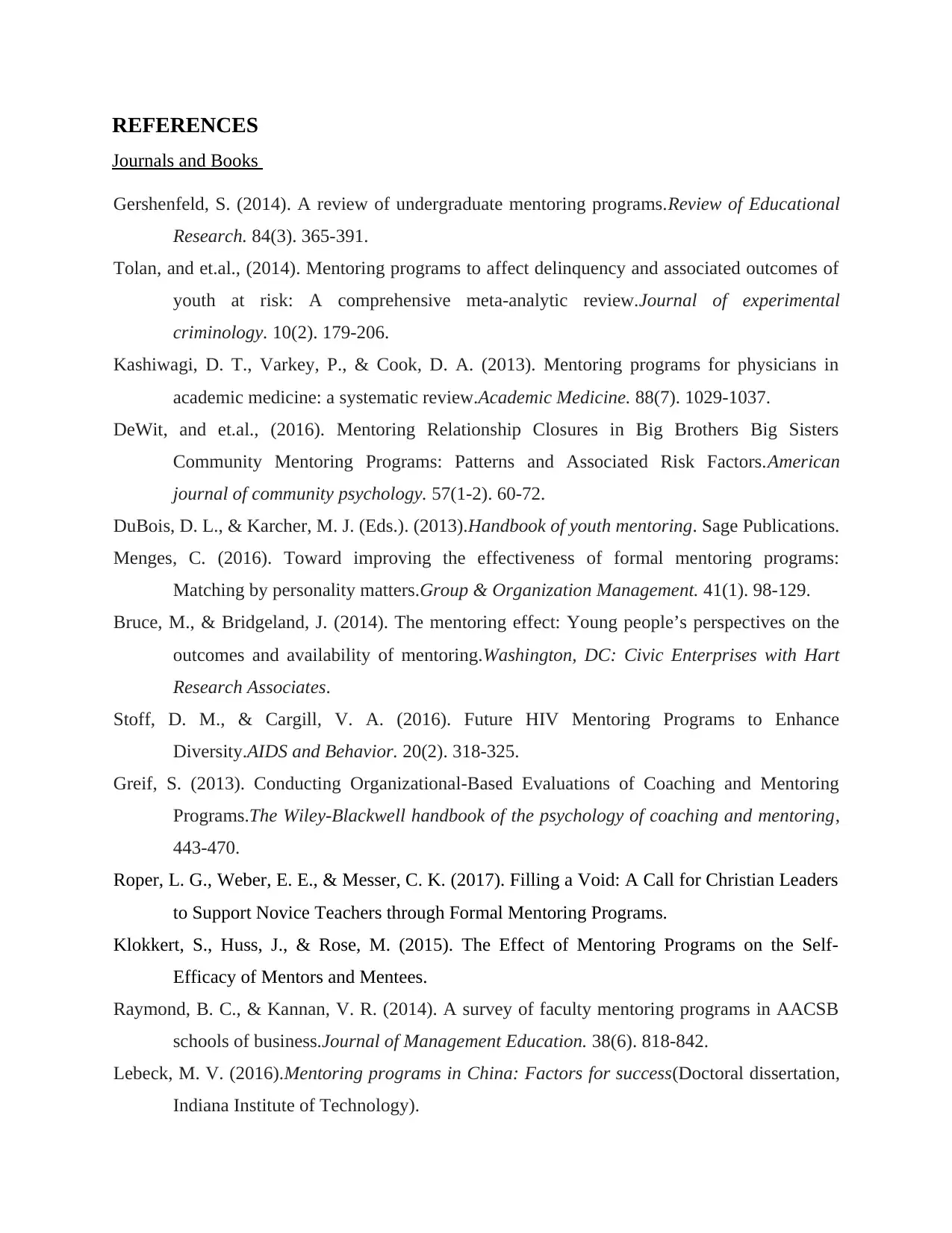
REFERENCES
Journals and Books
Gershenfeld, S. (2014). A review of undergraduate mentoring programs.Review of Educational
Research. 84(3). 365-391.
Tolan, and et.al., (2014). Mentoring programs to affect delinquency and associated outcomes of
youth at risk: A comprehensive meta-analytic review.Journal of experimental
criminology. 10(2). 179-206.
Kashiwagi, D. T., Varkey, P., & Cook, D. A. (2013). Mentoring programs for physicians in
academic medicine: a systematic review.Academic Medicine. 88(7). 1029-1037.
DeWit, and et.al., (2016). Mentoring Relationship Closures in Big Brothers Big Sisters
Community Mentoring Programs: Patterns and Associated Risk Factors.American
journal of community psychology. 57(1-2). 60-72.
DuBois, D. L., & Karcher, M. J. (Eds.). (2013).Handbook of youth mentoring. Sage Publications.
Menges, C. (2016). Toward improving the effectiveness of formal mentoring programs:
Matching by personality matters.Group & Organization Management. 41(1). 98-129.
Bruce, M., & Bridgeland, J. (2014). The mentoring effect: Young people’s perspectives on the
outcomes and availability of mentoring.Washington, DC: Civic Enterprises with Hart
Research Associates.
Stoff, D. M., & Cargill, V. A. (2016). Future HIV Mentoring Programs to Enhance
Diversity.AIDS and Behavior. 20(2). 318-325.
Greif, S. (2013). Conducting Organizational‐Based Evaluations of Coaching and Mentoring
Programs.The Wiley-Blackwell handbook of the psychology of coaching and mentoring,
443-470.
Roper, L. G., Weber, E. E., & Messer, C. K. (2017). Filling a Void: A Call for Christian Leaders
to Support Novice Teachers through Formal Mentoring Programs.
Klokkert, S., Huss, J., & Rose, M. (2015). The Effect of Mentoring Programs on the Self-
Efficacy of Mentors and Mentees.
Raymond, B. C., & Kannan, V. R. (2014). A survey of faculty mentoring programs in AACSB
schools of business.Journal of Management Education. 38(6). 818-842.
Lebeck, M. V. (2016).Mentoring programs in China: Factors for success(Doctoral dissertation,
Indiana Institute of Technology).
Journals and Books
Gershenfeld, S. (2014). A review of undergraduate mentoring programs.Review of Educational
Research. 84(3). 365-391.
Tolan, and et.al., (2014). Mentoring programs to affect delinquency and associated outcomes of
youth at risk: A comprehensive meta-analytic review.Journal of experimental
criminology. 10(2). 179-206.
Kashiwagi, D. T., Varkey, P., & Cook, D. A. (2013). Mentoring programs for physicians in
academic medicine: a systematic review.Academic Medicine. 88(7). 1029-1037.
DeWit, and et.al., (2016). Mentoring Relationship Closures in Big Brothers Big Sisters
Community Mentoring Programs: Patterns and Associated Risk Factors.American
journal of community psychology. 57(1-2). 60-72.
DuBois, D. L., & Karcher, M. J. (Eds.). (2013).Handbook of youth mentoring. Sage Publications.
Menges, C. (2016). Toward improving the effectiveness of formal mentoring programs:
Matching by personality matters.Group & Organization Management. 41(1). 98-129.
Bruce, M., & Bridgeland, J. (2014). The mentoring effect: Young people’s perspectives on the
outcomes and availability of mentoring.Washington, DC: Civic Enterprises with Hart
Research Associates.
Stoff, D. M., & Cargill, V. A. (2016). Future HIV Mentoring Programs to Enhance
Diversity.AIDS and Behavior. 20(2). 318-325.
Greif, S. (2013). Conducting Organizational‐Based Evaluations of Coaching and Mentoring
Programs.The Wiley-Blackwell handbook of the psychology of coaching and mentoring,
443-470.
Roper, L. G., Weber, E. E., & Messer, C. K. (2017). Filling a Void: A Call for Christian Leaders
to Support Novice Teachers through Formal Mentoring Programs.
Klokkert, S., Huss, J., & Rose, M. (2015). The Effect of Mentoring Programs on the Self-
Efficacy of Mentors and Mentees.
Raymond, B. C., & Kannan, V. R. (2014). A survey of faculty mentoring programs in AACSB
schools of business.Journal of Management Education. 38(6). 818-842.
Lebeck, M. V. (2016).Mentoring programs in China: Factors for success(Doctoral dissertation,
Indiana Institute of Technology).
⊘ This is a preview!⊘
Do you want full access?
Subscribe today to unlock all pages.

Trusted by 1+ million students worldwide
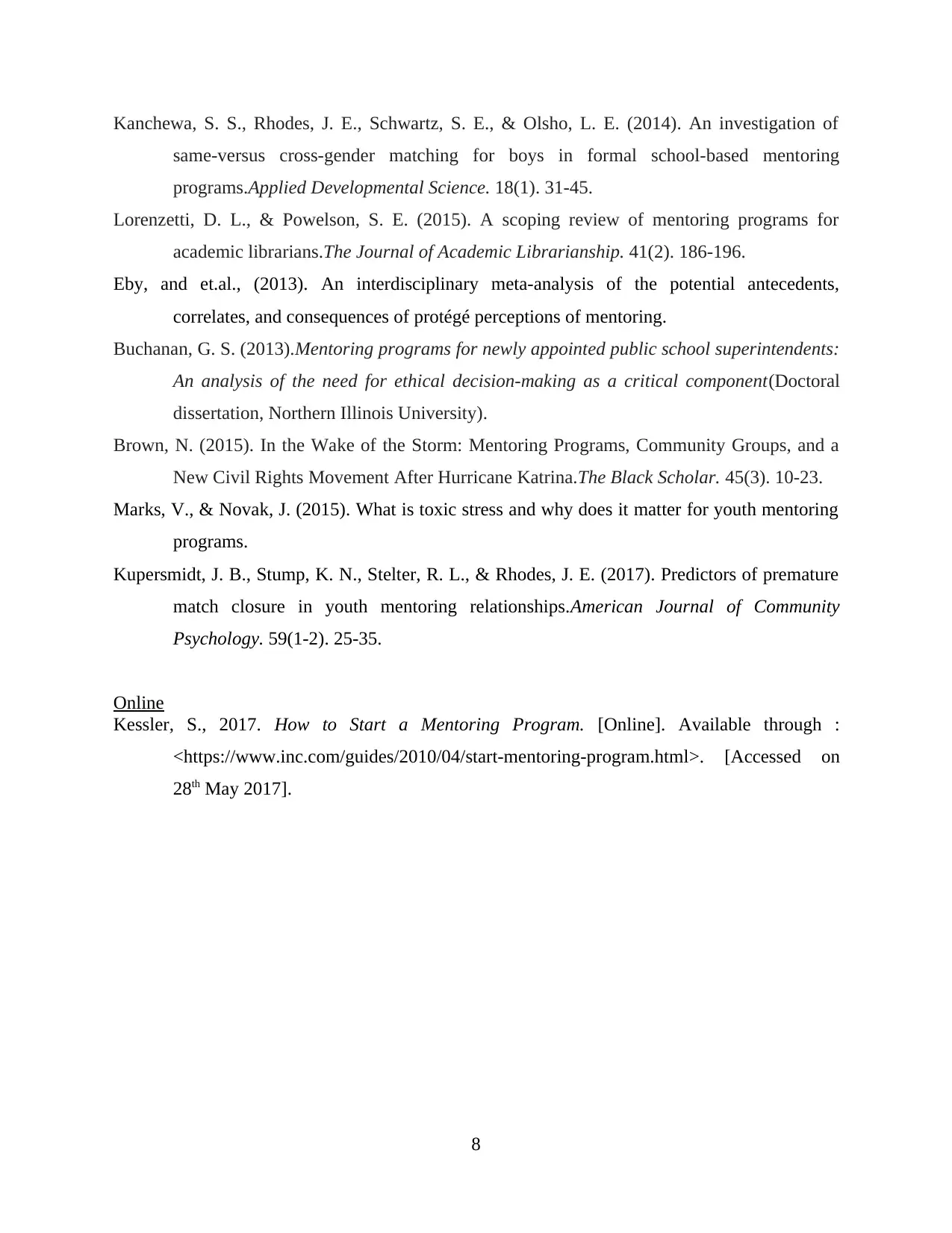
Kanchewa, S. S., Rhodes, J. E., Schwartz, S. E., & Olsho, L. E. (2014). An investigation of
same-versus cross-gender matching for boys in formal school-based mentoring
programs.Applied Developmental Science. 18(1). 31-45.
Lorenzetti, D. L., & Powelson, S. E. (2015). A scoping review of mentoring programs for
academic librarians.The Journal of Academic Librarianship. 41(2). 186-196.
Eby, and et.al., (2013). An interdisciplinary meta-analysis of the potential antecedents,
correlates, and consequences of protégé perceptions of mentoring.
Buchanan, G. S. (2013).Mentoring programs for newly appointed public school superintendents:
An analysis of the need for ethical decision-making as a critical component(Doctoral
dissertation, Northern Illinois University).
Brown, N. (2015). In the Wake of the Storm: Mentoring Programs, Community Groups, and a
New Civil Rights Movement After Hurricane Katrina.The Black Scholar. 45(3). 10-23.
Marks, V., & Novak, J. (2015). What is toxic stress and why does it matter for youth mentoring
programs.
Kupersmidt, J. B., Stump, K. N., Stelter, R. L., & Rhodes, J. E. (2017). Predictors of premature
match closure in youth mentoring relationships.American Journal of Community
Psychology. 59(1-2). 25-35.
Online
Kessler, S., 2017. How to Start a Mentoring Program. [Online]. Available through :
<https://www.inc.com/guides/2010/04/start-mentoring-program.html>. [Accessed on
28th May 2017].
8
same-versus cross-gender matching for boys in formal school-based mentoring
programs.Applied Developmental Science. 18(1). 31-45.
Lorenzetti, D. L., & Powelson, S. E. (2015). A scoping review of mentoring programs for
academic librarians.The Journal of Academic Librarianship. 41(2). 186-196.
Eby, and et.al., (2013). An interdisciplinary meta-analysis of the potential antecedents,
correlates, and consequences of protégé perceptions of mentoring.
Buchanan, G. S. (2013).Mentoring programs for newly appointed public school superintendents:
An analysis of the need for ethical decision-making as a critical component(Doctoral
dissertation, Northern Illinois University).
Brown, N. (2015). In the Wake of the Storm: Mentoring Programs, Community Groups, and a
New Civil Rights Movement After Hurricane Katrina.The Black Scholar. 45(3). 10-23.
Marks, V., & Novak, J. (2015). What is toxic stress and why does it matter for youth mentoring
programs.
Kupersmidt, J. B., Stump, K. N., Stelter, R. L., & Rhodes, J. E. (2017). Predictors of premature
match closure in youth mentoring relationships.American Journal of Community
Psychology. 59(1-2). 25-35.
Online
Kessler, S., 2017. How to Start a Mentoring Program. [Online]. Available through :
<https://www.inc.com/guides/2010/04/start-mentoring-program.html>. [Accessed on
28th May 2017].
8
1 out of 10
Related Documents
Your All-in-One AI-Powered Toolkit for Academic Success.
+13062052269
info@desklib.com
Available 24*7 on WhatsApp / Email
![[object Object]](/_next/static/media/star-bottom.7253800d.svg)
Unlock your academic potential
Copyright © 2020–2026 A2Z Services. All Rights Reserved. Developed and managed by ZUCOL.





